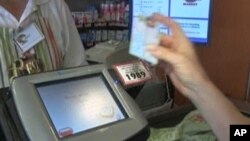The economic downturn and ongoing under-employment in the U.S. have resulted in a big increase in the number of Americans using food stamps. Once considered a social safety net for only the lowest income Americans, the use of federally funded food stamps has grown dramatically over the last two years. New government data shows one in eight Americans now rely on food stamps to make ends meet.
With nearly 15 million Americans out of work, a program once reserved for welfare recipients is becoming a fact of life for more Americans.
Musician and writer Rosalind Block is one of nearly 40 million people who rely on the Supplemental Nutrition Assistance Program, commonly known as food stamps.
After the recession hit, Block says she lost most of her clients, and then the father of her son died, leaving her with few choices.
"You know, here I am, Ivy League educated [by a top rated university], middle-aged person, you know, I should have my act together far more than to be in a situation like this. But when times are tough, I grabbed it," she said.
Block is not alone. In the last two years, U.S. government reports show the food stamp program added 11 million people - an increase of more than 40 percent.
Carlos Rodriguez at the New York City Food Bank says the recession had an impact on people from all walks of life.
"We've had stories of families who had reserves and savings, so they were playing by all the rules and making the best of their situation and this economic crisis has provided them with the need to come and access services that quite frankly, many of them never thought that they would be eligible or knew, were there for them," he said.
To be eligible, households must meet certain income requirements. For a family of four, that's a net monthly income of less than two thousand dollars per month.
Robert Doar, Commissioner of Social Services in New York City, says the most notable trend has been the increase in the number of working poor.
"In the old days food stamps was a safety net program for people that were not working. Now it's very much a work support, a work supplement for people that are working, and that's a big change," he said.
With so many Americans needing help, some say the other big change has been to the social stigma once attached to food stamps.
Rosalind Block says any sense of shame she once felt has now been replaced by relief and gratitude.




